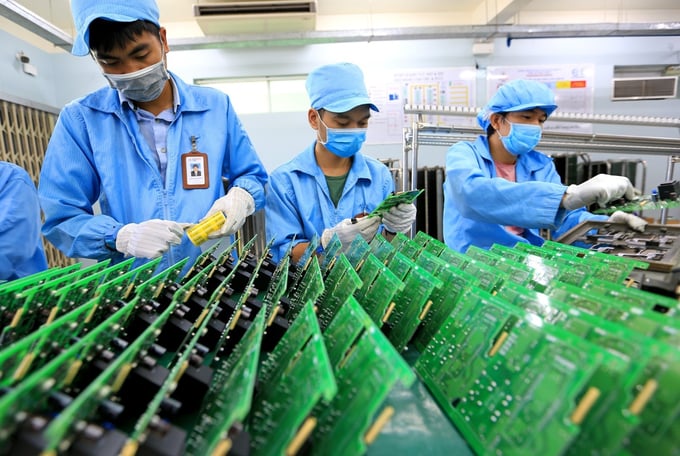November 26, 2025 | 13:30 GMT +7
November 26, 2025 | 13:30 GMT +7
Hotline: 0913.378.918
November 26, 2025 | 13:30 GMT +7
Hotline: 0913.378.918

The United States has not yet recognized Vietnam as a market economy.
The Ministry of Industry and Trade has determined that Vietnamese enterprises exporting products to the U.S. market will continue to encounter discrimination in U.S. anti-dumping and countervailing duty investigations due to the DOC's decision not to recognize Vietnam's market economy. The dumping margin will still be calculated using the "surrogate value" from a third country, as the actual production costs of Vietnamese enterprises will not be recognized.
"If the DOC objectively and fairly considered the documentation and practices in Vietnam, it could have acknowledged that Vietnam is already a market economy like 72 other economies, including major ones such as the UK, Canada, Mexico, Australia, Japan, India, South Korea, New Zealand, etc.," according to the announcement issued by the Ministry of Industry and Trade.
Vietnam's economy has experienced significant transformations and advancements over the past two decades. Vietnam has successfully signed and implemented 17 free trade agreements (FTAs), including high-standard, next-generation FTAs with the European Union (EU), CPTPP countries, and the United Kingdom. These agreements encompass extensive and comprehensive commitments, including enhancing labor standards, environmental protection, government procurement, transparency, and tariff reductions. It has also ensured sustainable development.
The Ministry of Industry and Trade submitted more than 20,000 documents to the DOC, demonstrating the changes. This evidence proves Vietnam's substantial progress in all six criteria established by the DOC for the recognition of a market economy, including the degree of currency convertibility, wage and labor negotiation issues between workers and employers, the level of foreign investment in economic activities, the issues of state ownership versus private ownership, the degree of government control over certain resources and prices, and other relevant factors.
Vietnam's adherence to these six criteria is at least on par with, and often better than, the level of implementation by other countries already recognized as market economies, as well as comparable to or better than countries that have always been considered market economies, as the arguments provided by the Ministry of Industry and Trade also fully and consistently demonstrate.
The Ministry of Industry and Trade underscored that Vietnam's classification as a market economy is an objective and equitable reality, as determined by the standards of U.S. law.
The Ministry also extended its gratitude to 41 organizations, individuals, and business and trade associations in the United States that have enthusiastically advocated for Vietnam's recognition as a market economy. This encompasses organizations and individuals that represent U.S. enterprises, including the American Chamber of Commerce (AmCham), the National Association of State Departments of Agriculture (NASDA), the U.S.-ASEAN Business Council (USABC), and the National Retail Federation.
I am optimistic that the Ministry will continue to receive the assistance of these organizations and individuals in the future.
The Ministry of Industry and Trade will commence and continue to investigate and analyze the arguments in the DOC's Report on Vietnam's economy at the earliest opportunity. The objective is to enhance and refine the arguments to submit a dossier to the DOC, requesting that it reconsider Vietnam's market economy status. The objective is solidifying the Comprehensive Strategic Partnership between the United States and Vietnam, fostering bilateral economic, trade, and investment cooperation. This will provide tangible benefits to the people and enterprises of both countries.
Furthermore, the Ministry of Industry and Trade will assist Vietnamese businesses that export to the U.S. market in anti-dumping and countervailing investigations to guarantee that the Vietnamese business community receives the greatest possible benefits.
Translated by Linh Linh

(VAN) Thanh Hoa province has substantial potential to supply carbon credits, opening opportunities for green economic development, enhancing agriculture and forestry value.
/2025/11/25/1741-0-nongnghiep-221736.jpg)
(VAN) The application of AI helps identify emission sources and assess air pollution developments, thereby supporting management agencies in issuing timely and appropriate control policies.

(VAN) Viet Nam will develop its carbon market not only by prioritizing transaction volumes but also by transitioning to a low-emission economy.
/2025/11/25/3413-1-171953_261.jpg)
(VAN) Experts from the Vietnam Academy of Science and Technology have conducted surveys to identify the causes of landslides in Lam Dong province and propose natural disaster prevention solutions.

(VAN) The HNT reservoir operation support system, developed by WeatherPlus in collaboration with Kyushu Electric Power, enables real-time rainfall forecasting, inflow forecasting, and flood-release simulations.

(VAN) Dr. Cao Duc Phat stated that the localization of early natural disaster warning technologies will help meet practical requirements and create favorable conditions for domestic research institutions and businesses to develop.

(VAN) In addition to improving early-warning technologies, there is a need for software that can guide response actions, track community evacuations, and manage safe zones through digital mapping.